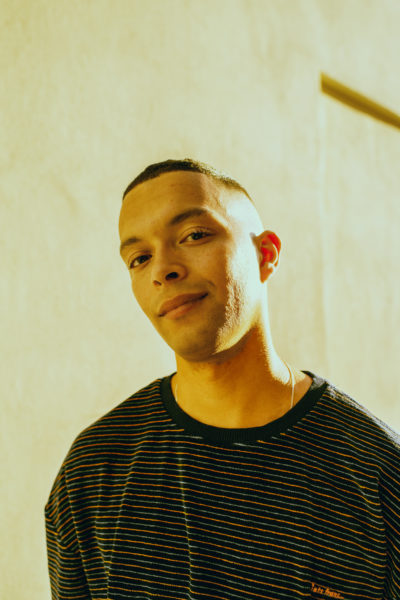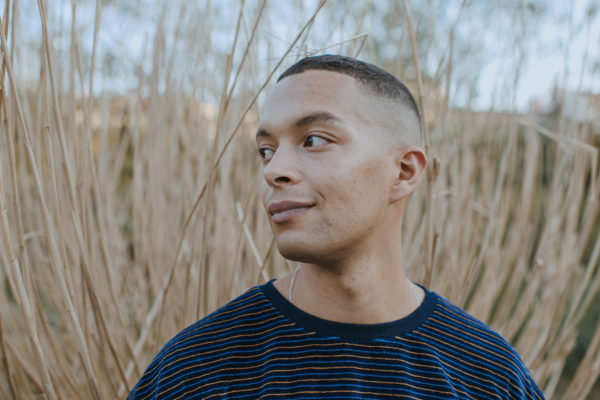An imaginative outlook is, as McCutcheon tells zweikommasieben‘s Mathis Neuhaus after the festival, of great importance to him. Not only for his DJ-sets and own productions, but also for the music he is putting out through his label Timedance by artist like Ploy, Laksa, Metrist, and most recently Air Max ’97. This observation anchors a conversation that circles around defining terms and what to make of them; if anything.
Mathis Neuhaus I would like to talk about two terms with you that come to mind when thinking about the music you are associated with. The first one is “fun.” Is this a term you consider for the music you are playing, producing, or putting out?
Omar McCutcheon I guess I don’t want things to feel prescriptive in any way, really. I would not want to be known as a DJ who is just there for vacuous pleasure. But I also would not want to be known as someone who is purely representing something dark and oppressive, I find that kind of thing so dull. I do not think many things in life can be attributed to one emotion and I also want my music to encompass everything. I think it is a very UK-centric trait to try and make people feel a range of different emotions on the dancefloor in a relatively short amount of time—I am proud of that. Parts of my sets or my music can be pretty dark and heavy, but for me it is really important that it comes from a place where it feels like the music is on the audience’s side. I like the limitations of having an element of accessibility.
MN And what do you make of the term “experimental?”
OMC It is not a term I pay much attention to. “Experimental,” to me, is a marketing term used for selling tickets more than anything. But we see this all the time with music and culture. It is just another one of those labels which tries to make things easier to consume.
MN Maybe “experimental” does not sound right to you, but “experimenting” does?
OMC Yes. But rather than that I would want to make the case for the term “imaginative.” “Experimental” gives me an image of some serious, old, academic white men talking about concepts in fancy rooms. I think new forms of culture and art—and perhaps this is what we require more than experimentalism?—need to be inclusive and worldwide. So much of western culture is self-referential and elitist, it is boring as a result. Look further afield, in Asia or Africa or South America and you will find endless uncompromised creativity right now. But I do not think that has got much to do with labels like “experimental.” My point is: we could all benefit from pushing forward culture, and culture that comes from a lot of different perspectives and places. I think it is pretty vital to the future of the human race. The baggage that comes with the term “experimental” is unrelated to what I see myself doing, I feel like it is only relevant to a tiny cross section of society.
MN You are mentioning a baggage and I want to use that opportunity to ask you a question that I also asked Parris recently. For an artist, can the rich history of electronic music in the UK sometimes feel suffocating? Nostalgia is the elephant in the room here.
OMC I think it is a problem that a lot of artists from the UK face. The history and music of this island can be an overbearing force which can be completely defining and leave a small amount of room for true expression. I have that problem just as much as anyone else and I like to try and think more about musical history in terms of attitudes. There are attitudes to be found in UK dance music, especially from the time when certain genres were coming up; when whatever scene was at their most innovative. You can take that energy and idea and repurpose it in a different way where it is not necessarily about the sounds. Rather than thinking about jungle in terms of breakbeats, I would like to try to capture the energy of that genre at its peak, but in a new and different way. I want to repurpose an idea without using sonic identification as the means of doing it. I look a lot to old music for those reasons, but the technology moves forward and I think the sound should represent that.
MN The term “sound design,” that is very en vogue these days, comes to mind.
OMC I think the implications of the term are good, because this idea of “back to basics” and fostering an analogue revival by just relying on a drum machine, a compressor, and one synthesizer does not really appeal to me. I am not saying that there cannot be something cool and interesting coming out of a limited set-up, but we have access to so many amazing tools. I have been to my studio today and the possibilities feel endless with a computer to produce new sounds. I want that what I am expressing feels like being part of the now and not like it could have come out 25 years ago. Likewise, I hope that the music I am producing today does not sound fresh anymore in ten years. I think the good thing about the term “sound design” is that it feels very contemporary and is evolving really fast and there is a real dialogue between manufacturers and the people making music. This feels exciting to me, to find out what is next.
MN Timedance’s ouput feels curated in the sense that it has a strong musical vision. How do you approach new projects or artists? Differently put: what makes a Timedance-record a Timedance-record? Are there criteria?
OMC There are a lot. It is very rare that I get records or tracks which I just release. There tends to be a lot of going back and forth and pushing the artists to get to a point where I really like it. It is about nailing the small aesthetic details to really achieve the sounds that fit the label. In that sense, I take curation very seriously. I want the music to feel like it is supposed to be on Timedance and not on any other label. I am looking for producers that have a sonic identity which matches my vision. And this tends to be people who are using fairly contemporary tools. I am looking for stuff generally that has a certain sound quality, which could be described as sharp, I guess. Sometimes, the ideas are not as fully formed as I could see them getting and for me, it is getting them to this point by going over all the details. The main thing which is making these tracks feel like Timedance-tracks is the small details and eventually if you put enough work into them you will get a bigger sense of everything going together. It is definitely the case of getting back and forth for months, years in some cases, to achieve a point where I really think it fits. Imposing decisions is not my specialty, but that is because I don’t leave many things to chance.
MN As a place of musical heritage, what has Bristol got to do with Timedance?
OMC When I was a bit younger and really into dubstep and when my taste started to evolve, Bristol was the key place. Pinch and Peverelist, who released my first two records, defined a lot for me with their approach. As a result, the early days of Livity Sound especially completely aligned with what I was interested in. Nowadays it is slightly different for me, because I have been living in Bristol for quite a long time. I am gaining a lot of influence from music from other places and parts of the world. Bristol is still a constant hub of creativity and great people, it feels good to be a part of. I just feel less and less personally aligned with the output of the city.
MN You mentioned the aspect of accessibility before and I think it is safe to say that the stages you are playing get bigger and bigger right now. Is this something you easily adapted to?
OMC There has been a point, maybe one and a half years ago, where I felt like I was playing to really good-sized rooms and to educated crowds. I did not need to worry about compromising too much and thought “Do I even want to play any bigger stages?” I was not sure if I would have felt comfortable with that or have to dumb down what I do more. I ended up doing it anyways and what I learned is that people are often way more receptive to different things than what they get credit for. There is a certain amount of adapting, obviously, because a 200-capacity basement is different to a stage with 5000. But, at the same time, I really feel like I got something different to show those people. I am also not DJing to please everyone. I am as happy to piss off a few people when I am inspiring some, too. The transition to bigger rooms was interesting, definitely, but also relatively seamless. And I definitely get opportunities to play in good places. There have been a few times where I surprised myself with what I got to play in big settings, it is a great feeling.
MN Do you consider yourself a tastemaker?
OMC No, I do not. I just listen through loads of music and pick things I like. It does not go much further than that really. I think about my DJ-sets as an extension of my musical tastes, my label, and my productions. Everything is the same and part of the same thing, I just look for things that fit. I do not want to play loads of stuff that people are familiar with, because I think people switch off a little bit when a track they have heard many times before comes on. I like leaving people in a moment of uncertainty on a dancefloor. All my favorite moments dancing have come from this. But, genuinely, it is more about looking for things that resonate with me than anything else.

